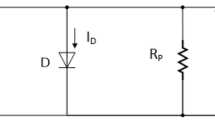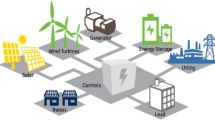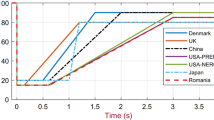Abstract
Microgrid systems are becoming a very promising solution to meet the power demand growth especially in remote areas where diesel generators (DG) are commonly used as a main energy source. Photovoltaic (PV) systems are commonly used as a sustainable energy source to economize DG fuel. Due to the intermittent and fluctuating behavior of PV generators, energy storage systems (ESS) such as electrochemical battery are suggested. PV and ESS are usually connected using one inverter/charger called hybrid inverter. The power management is crucial to optimize the fuel consumption and operate efficiently ESS. Additionally, in an off-grid operation, the microgrid frequency becomes sensible due to the slow dynamic of DG which requires an additional control tool to improve the frequency regulation. This paper proposes a new power management based on Mamdani fuzzy logic. The proposed controller considers the targets mentioned above by only controlling the hybrid inverter. Simulation results prove that fuzzy-based controller reduces the DG fuel consumption by more than 12% compared to classical hysteresis management control. Moreover, the proposed controller performs efficiently regarding the conventional frequency regulation, which is widely used in microgrid control.































Similar content being viewed by others
Abbreviations
- I ph :
-
Photocurrent
- I :
-
Diode saturation current
- q :
-
Coulomb constant (1.602 × 10−19 C)
- K :
-
Boltzmann’s constant (1.38 × 10−23 J/K)
- T :
-
Cell temperature
- PN:
-
P–N junction ideality factor
- R s :
-
Intrinsic series resistance
- R sh :
-
Intrinsic parallel resistance
- S :
-
Real solar radiation
- S ref :
-
Solar radiation in standard test conditions (1000 w/m2)
- T ref :
-
Cell absolute temperature in standard test conditions
- I ph-ref :
-
Photocurrent in standard test conditions
- C T :
-
Temperature coefficient
- I s-ref :
-
Diode saturation current in standard test conditions
- E g :
-
Band-gap energy of the cell semiconductor
- E :
-
Battery no-load voltage
- E o :
-
Battery constant voltage
- k :
-
Polarization voltage
- Q :
-
Battery capacity
- A :
-
Exponential zone amplitude
- B :
-
Exponential zone time constant inverse
- E full :
-
Fully charged voltage
- E exp :
-
Voltage at the end of exponential zone
- Q exp :
-
Charge at the end of exponential zone
- E nom :
-
Voltage at the end of nominal zone
- Q nom :
-
Charge at the end of nominal zone
- F min :
-
Minimum allowed frequency value
- F r :
-
Regulation frequency value
- F max :
-
Maximum allowed frequency value
- T sm :
-
Governor time constant
- T d :
-
Engine time constant
- R :
-
Frequency drop
- V f :
-
Excitation voltage of the synchronous machine
- MPPT:
-
Maximum power point tracking
- P&O:
-
Perturb and observe
- PV:
-
Photovoltaic
- SOC:
-
State of charge
- ESS:
-
Energy storage system
- PM:
-
Power management
- MG:
-
Microgrid
- FL:
-
Fuzzy logic
- DC:
-
Direct current
- AC:
-
Alternative current
- DG:
-
Diesel generator
References
Zhang D, Shah N, Papageorgiou LG (2013) Efficient energy consumption and operation management in a smart building with microgrid. Energy Convers Manag 74:209–222
Rossi I, Banta L, Cuneo A, Ferrari ML, Traverso AN, Traverso A (2016) Real-time management solutions for a smart polygeneration microgrid. Energy Convers Manag 112:11–20
Zhang L, Gari N, Hmurcik LV (2014) Energy management in a microgrid with distributed energy resources. Energy Convers Manag 78:297–305
Hernández ACL, Meng L, Aldana NLD, Graells M, Quintero JCV, Guerrero JM (2017) Online energy management systems for microgrids: experimental validation and assessment framework. IEEE Trans Power Electron 33:2201–2215
Hernández ACL, Aldana NLD, Savaghebi M, Quintero JCV, Guerrero JM (2016) Optimal Power Scheduling for an islanded hybrid microgrid. In: Proceedings of 2016 8th international power electronics and motion control conference—ECCE Asia (IPEMC 2016-ECCE Asia)
Parvizi-Mosaed M, Farmani F, Anvari-Moghaddam A (2013) Optimal energy management of a micro-grid with renewable energy resources and demand response. J Renew Sustain Energy 5:053148
Piagi P, Lasseter RH (2006) Autonomous control of microgrids. In: IEEE PES meeting, Montreal, June 2006
Ma Y, Yang P, Wang Y, Zhou S, He P (2014) Frequency control of Islanded microgrid based on wind-PV-diesel-battery hybrid energy sources. In: 17th international conference on electrical machines and systems (ICEMS), Hangzhou, China, 22–25 Oct 2014
Habib M, Ladjici AA, Khoucha F (2015) Frequency control in off-grid hybrid diesel/PV/battery power system. In: 4th international conference on electrical engineering. University of Boumerdes, Algeria, 13–15 Dec 2015
Oureilidis KO, Bakirtzis EA, Demoulias CS (2016) Frequency-based control of islanded microgrid with renewable energy sources and energy storage. J Mod Power Syst Clean Energy 4(1):54–62
Datta MS, Yona T, Funabashi A, Chul-Hwan Kim T (2011) A frequency-control approach by photovoltaic generator in a PV–diesel hybrid power system. IEEE Trans Energy Convers 26:559–571
Singh S, Singh SK, Chanana S, Singh YP (2014) Frequency regulation of an isolated hybrid power system with battery energy storage system. In: Power and energy systems conference: towards sustainable energy, 2014
Mi Y, Fu Y, Zhao JB, Wang P (2013) The novel frequency control method for PV-diesel hybrid system. In: 10th IEEE international conference on control and automation (ICCA), 12–14 June 2013
Tiar M, Betka A, Drid S, Abdeddaim S, Becherif M, Tabandjat A (2017) Optimal energy control of a PV-fuel cell hybrid system. Int J Hydrog Energy 42(2):1456–1465
Han Y, Zhang G, Li Q, You Z, Chen W, Liu H (2018) Hierarchical energy management for PV/hydrogen/battery island DC microgrid. Int J Hydrog Energy. https://doi.org/10.1016/j.ijhydene.2018.08.135
Ou K, Yuan WW, Choi M, Yang S, Jung S, Kim YB (2018) Optimized power management based on adaptive-PMP algorithm for a stationary PEM fuel cell/battery hybrid system. J Hydrog Energy 43:15433–15444
Tabanjat A, Becherif M, Hissel D, Ramadan HS (2018) Energy management hypothesis for hybrid power system of H2/WT/PV/GMT via AI techniques. Int J Hydrog Energy 43(6):3527–3541
Hosseini H, Tousi B, Razmjooy N (2014) Application of fuzzy subtractive clustering for optimal transient performance of automatic generation control in restructured power system. J Intell Fuzzy Syst 26(3):1155–1166
Razmjooy N, Mehdi R, Noradin G (2017) Imperialist competitive algorithm-based optimization of neuro-fuzzy system parameters for automatic red-eye removal. Int J Fuzzy Syst 19(4):1144–1156
Payman M, Razmjooy N, Mousavi BS (2014) Robust potato color image segmentation using adaptive fuzzy inference system. Iran J Fuzzy Syst 11(6):47–65
Habib M, Khoucha F (2014) On line energy management strategies for fuel cell/battery electric vehicle: from rules logic to fuzzy logic strategy. In: 2nd international conference on electrical engineering and control applications, Constantine, Algeria, 18–20 Nov 2014
Kermadi M, Berkouk A (2017) Artificial intelligence-based maximum power point tracking controllers for Photovoltaic systems: comparative study. Renew Sustain Energy Rev 69:369–386
Harrag A, Messalti S (2018) Adaptive GA-based reconfiguration of photovoltaic array combating partial shading conditions. Neural Comput & Applic 30(4):1145–1170
Kyriakarakos G, Dounis AI, Arvanitis KG, Papadakis G (2012) A fuzzy logic energy management system for polygeneration microgrids. Renew Energy 41:315–327
Datta M, Senjyu T, Yona A, Funabashi T (2011) A fuzzy based method for leveling output power fluctuations of photovoltaic-diesel hybrid power system. Renew Energy 36:1693–1703
Roumila Z, Rekioua D, Rekioua T (2017) Energy management based fuzzy logic controller of hybrid system wind/photovoltaic/diesel with storage battery. Int J Hydrog Energy 42(30):19525–19535
Papathanassiou SA, Papadopoulos MP (2001) Dynamic characteristics of autonomous wind-diesel systems. Renew Energy 23:293–311
Tremblay O, Dessaint LA, Dekkiche A (2007) A generic battery model for the dynamic simulation of hybrid electric vehicles. In: Proceedings of the 2007 IEEE vehicle power and propulsion conference, pp 284–289
Long B, Jeong TW, Lee JD, Jung YC, Chong KT (2015) Energy management of a hybrid AC–DC micro-grid based on a battery testing system. Energies 8:1181–1194
Author information
Authors and Affiliations
Corresponding author
Ethics declarations
Conflict of interest
The authors declare that they have no known competing financial interests or personal relationships that could have appeared to influence the work reported in this paper.
Additional information
Publisher's Note
Springer Nature remains neutral with regard to jurisdictional claims in published maps and institutional affiliations.
Rights and permissions
About this article
Cite this article
Habib, M., Ladjici, A.A. & Harrag, A. Microgrid management using hybrid inverter fuzzy-based control. Neural Comput & Applic 32, 9093–9111 (2020). https://doi.org/10.1007/s00521-019-04420-5
Received:
Accepted:
Published:
Issue Date:
DOI: https://doi.org/10.1007/s00521-019-04420-5




